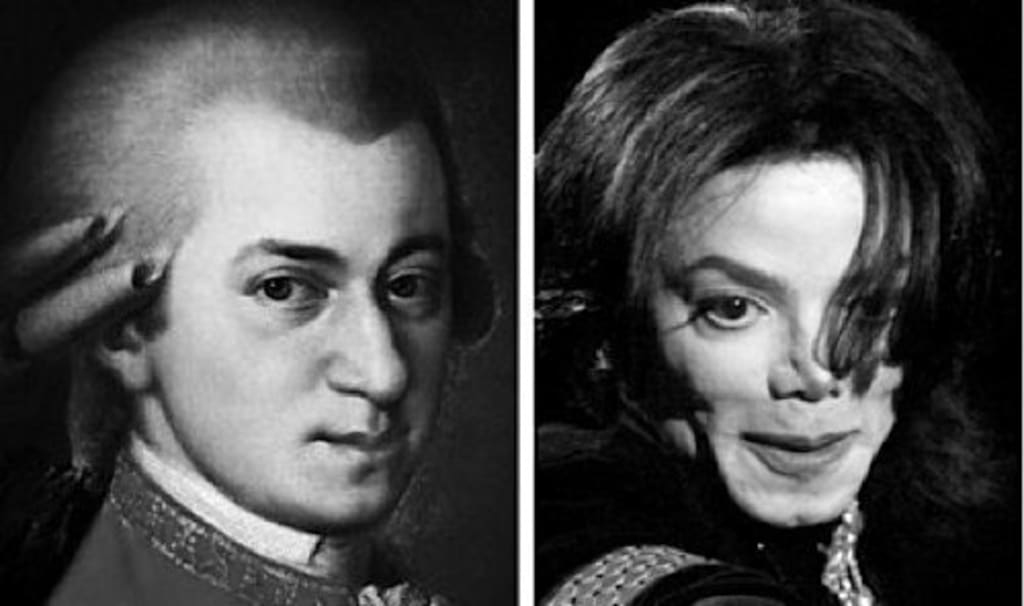
Historians and scientists alike have drawn uncanny parallels between two of the world’s most well-known musicians: Austrian composer Wolfgang Amadeus Mozart and “King of Pop” singer Michael Jackson. Both were born as the seventh children in their families and toured their countries as young prodigies. However, these similarities were not what captured the interest of several psychologists, but their personalities, which could be described as eccentric and even related to one another. The psychological likenesses between Mozart and Jackson point to the childhood abuse and pressure they faced.
At a young age, Mozart’s and Jackson’s fathers forced them to make music instead of allowing them to have a true childhood, which may contribute to their odd personalities. Psychologist Shelley Carson analyzed the studies of a Harvard researcher, who investigated if schizophrenia is genetic. Carson concluded that “schizotypal individuals may inherit the unconventional modes of thinking and perceiving associated with schizophrenia without inheriting the disease itself.” Another psychologist, Stephanie Brunner, points out that Jackson displayed symptoms of inheriting his father’s Narcissistic Personality Disorder, which “influenced and impacted his family." For example, Jackson would stand motionless before a screaming audience to win their admiration, or react only to comments of praise from his friends. Brunner mentions that “Joe Jackson (as stated by Michael Jackson) ‘had a belt in his hand’ as Michael and his brothers rehearsed and that [if] you didn’t do it right, he would tear you up." Jackson’s father was also forcefully involved in his son’s life, living in Jackson’s home and booking his shows for him even when he was an adult. According to psychologist Simone Hoermann, Mozart was believed to have Dependent Personality Disorder, “relying on his father to manage his money for him” and “needing to be nurtured and supported by others, for instance, his wife or his father." This is the only time she mentions Mozart’s father playing a role in his son’s life, even though Mozart was made to travel constantly in his earliest years. The two musicians shared a rigorous childhood in which they were forced to perform, which could be why they had similar personalities as adults.
Another aspect pointing to the musicians’ shared personalities is that they received a plethora of incoming pressure. Carson presents a study performed at the University of Graz in Austria that focused on the pressure that creative individuals put on themselves. It evaluated the relation between alpha brain waves, which cause the mind and body to stay awake, and creativity. She concluded that “increased alpha activity indicates that the brain is focusing on internally generated stimuli rather than on the outside world…. Explains the tendency of creative people to focus on their inner lives." Likewise, Hoermann defines personality disorder as “an enduring pattern of inner experience or behavior that deviates markedly from the expectations of the individual’s culture." She and Brunner mention how this pressure could be the reason that Mozart and Jackson experienced hypomania, in which they worked from the early morning and well into the night. Mozart was idolized by those who knew him; after all, he was the toast of Viennese society and there was always a wild demand for his music across reputable European venues. Similarly, the ever-watchful eyes of Jackson’s fans made him strive for perfection in all his practice regimes. Those who worked with him described “how he worked extremely hard and for very long hours to achieve perfection,” and the choreographer of Jackson’s “This Is It” tour said he would receive calls throughout the night from the musician expressing “different ideas or changes." Both Mozart and Jackson pressured themselves as musicians because there was a high demand for their music from people throughout their countries.
Similarities can be drawn between the two musicians and their personalities, which may be attributed to their childhood abuse and incoming pressure. Hoermann’s and Brunner’s research into the lives of Mozart and Jackson sheds light on their mindsets, while Carson presents a study about the psychology of creative individuals. The experiences of these musicians can be a lesson to young musicians and their parents: childhood abuse and pressure can change the way a person perceives himself and other people. Parents should always be kind and encouraging toward their children, while allowing them to live out their childhood. Soon those children will mature, and they will love the rewards of hard work instead of feeling incredibly pressured to please everyone.
Works Cited:
Brunner, Stephanie. “Michael Jackson: Was He the Man in the Mirror?” Journal of Integrated Studies. 2013. jis.athabascau.ca/index.php/.
Carson, Shelley. “The Unleashed Mind: Why Creative People Are Eccentric.” Creative Alliance Milwaukee. 3 Jan. 2012. http://creativealliancemke.org.
Hoermann, Simone. “Wolfgang Amadeus Mozart: Personality Disorder or Bipolar Disorder?” MentalHelp.Net. 13 Aug. 2009. www.mentalhelp.net/blogs/wolfgang-amadeus-mozart-personality-disorder-or-bipolar-disorder/.
About the Creator
Sarah Bryan
My main passion is for playing the piano. Currently, I am a music major in Texas and I just recently won one of the most prestigious music awards known as the Clara Freshour Nelson Music Scholarship which is awarded to 15 college freshmans.






Comments
There are no comments for this story
Be the first to respond and start the conversation.